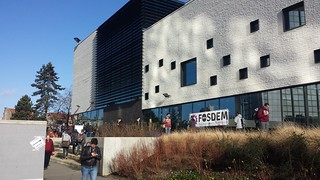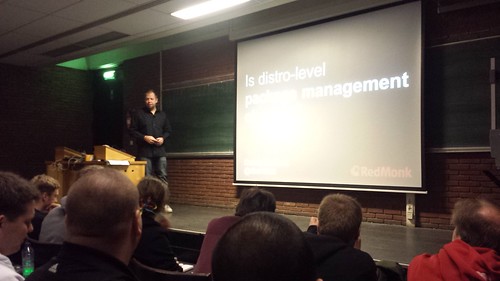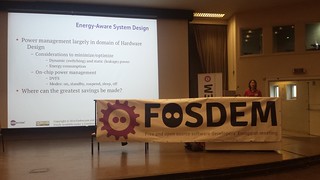 I've been wanting to go to FOSDEM 2014 ever since I left last years conference. Apart from being only about Free Software, what I really enjoy is the large number of talks and the great diversity. In one day I get more input from different fields than I normally do in a year. I've browsed the talks up and down, staring all the ones I got curious about, and that was much more than I could watch. That's the problem, and the greatness, of FOSDEM. With 23 parallel tracks it get's really hard to choose!
I've been wanting to go to FOSDEM 2014 ever since I left last years conference. Apart from being only about Free Software, what I really enjoy is the large number of talks and the great diversity. In one day I get more input from different fields than I normally do in a year. I've browsed the talks up and down, staring all the ones I got curious about, and that was much more than I could watch. That's the problem, and the greatness, of FOSDEM. With 23 parallel tracks it get's really hard to choose!
For the first hour, I had six different talks starred. Looking at the list got me thinking: I'll probably learn the most by visiting the talk about which I know the least. Which lead me to Introduction to Ada for Beginning and Experienced Programmers by Jean-Pierre Rosen.
I learned that Ada is a very strictly typed imperative language based on Pascal syntax. It's used in situations where formal verification is needed, such as control systems for trains, airplanes and satellites. It seems to have a great module system, which I would like to know more about. I'm not going to jump to Ada, but I will remember to have a second look next time I'm thinking about strict typing.
 Then, I had five minutes to get to another building for Is distribution-level package management obsolete? by Donnie Berkholz. Berkholz was arguing that Linux distributions are becoming irrelevant. The distributions haven't really evolved since 1998. It's not mandatory for distros to exist, they need to provide value to their end users, which includes developers. The current trend is in systems like NixOS, CoreOS and containers. I think it's a very good point and something to think about. For me, packaging is great. It's an executable description on what's needed for a piece of software to run. But I can clearly see the resistance by devs. I liked the idea of thinking of it as an opportunity to improve rather than "the devs are wrong".
Then, I had five minutes to get to another building for Is distribution-level package management obsolete? by Donnie Berkholz. Berkholz was arguing that Linux distributions are becoming irrelevant. The distributions haven't really evolved since 1998. It's not mandatory for distros to exist, they need to provide value to their end users, which includes developers. The current trend is in systems like NixOS, CoreOS and containers. I think it's a very good point and something to think about. For me, packaging is great. It's an executable description on what's needed for a piece of software to run. But I can clearly see the resistance by devs. I liked the idea of thinking of it as an opportunity to improve rather than "the devs are wrong".
It was already time for lunch. Me and Noa Resare met up with EU policy analyst and volunteer at Free Software Foundation Europe, Eszter Bakó. It was enlightening (and a bit scary!) to hear about what the EU is currently up to. She reminded us that the EU copyright reform questionnaire has been extended: Everyone should go and have their say!
 After lunch I went to Who ate my battery? by Jeremy Bennett and Kerstin Eder. They've been measuring how much energy different instructions take, and it turns out there's lots of room for improvement. I've always thought that the fewer clock cycles something takes, the less energy it takes, so optimizing for performance should be the same as optimizing for energy efficiency. Fewer clock cycles is good, other stuff affects energy usage too, such as memory access. The presenters where, among other things, developing a gcc flag to optimize for energy efficiency. That's cool!
After lunch I went to Who ate my battery? by Jeremy Bennett and Kerstin Eder. They've been measuring how much energy different instructions take, and it turns out there's lots of room for improvement. I've always thought that the fewer clock cycles something takes, the less energy it takes, so optimizing for performance should be the same as optimizing for energy efficiency. Fewer clock cycles is good, other stuff affects energy usage too, such as memory access. The presenters where, among other things, developing a gcc flag to optimize for energy efficiency. That's cool!
Being fed by interesting talks at this rate and running between buildings, is tiring. But the talk about Mailpile by Bjarni Rúnar Einarsson was not. It's a new mail client which tries to bring the features that we've come to expect from services like Gmail and put them back in a local mail client. Doing so would allow for deep integration with PGP, which is a main goal for Mailpile. I can really see the need, and I'm hoping for them to succeed. At the talk they announced the release of an alpha version. I'm looking forward to see the progress of this project.
Continue to second day.